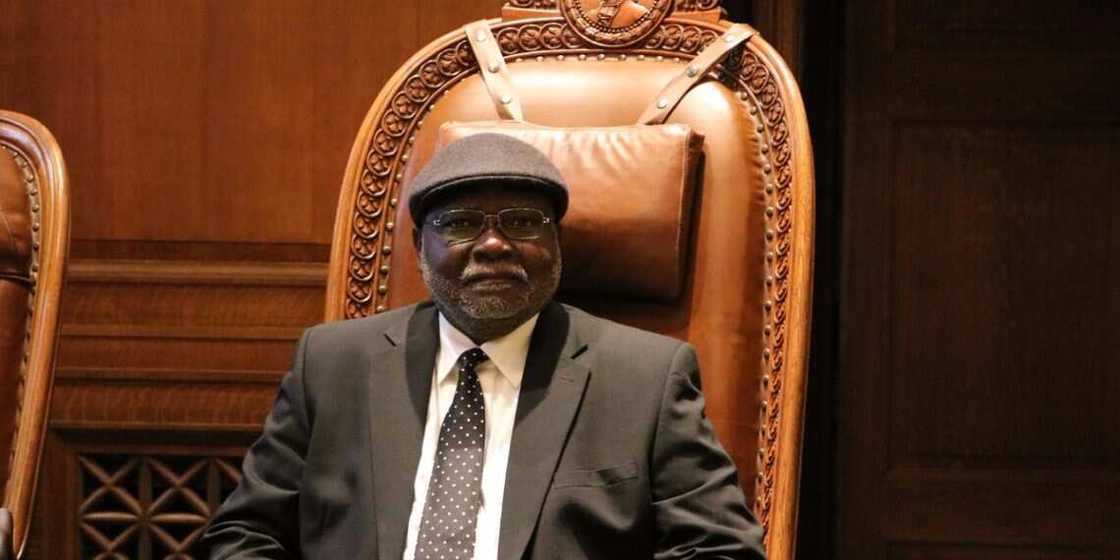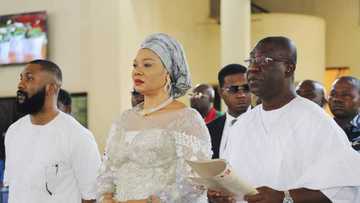Meet the New Chief Justice of Nigeria, 15 Details To Know About Him
Following the suden resignation of of Justice Tanko Muhammad. as the Chief Justice of Nigeria, Justice Olukayode Ariwoola is expected to be sworn in as the next CJN.
PAY ATTENTION: Click “See First” under the “Following” tab to see Legit.ng News on your Facebook News Feed!
Recall that Mr Tanko had resigned from his position reportedly on health grounds, according to a statement by the CJN’s Special Assistant on Media, Isah Ahuraka.
As a result of this, Ariwoola who is the next most senior after Justice Mary Odili retired on May 12, after attaining the retirement age of 70 will be sworn in as acting CJN.
Below are things you need to know about the new acting CJN as reported by Daily Nigerian.

Source: UGC
- Mr Ariwoola, too, is billed to leave the Judicial service in 2028.
- Justice Olukayode Ariwoola was appointed a Justice of the Supreme Court of Nigeria in 2011.
- His Lordship was a Justice of the Court of Appeal between 2005 and 2011 after having been elevated from the State High Court of Oyo State.
- His Lordship was first appointed a Judge of Superior Court of record in Oyo State in 1992 from private legal practice.
- Lord Ariwoola started his educational career in his home town Iseyin at the Local Authority Demonstration School, Oluwole in Iseyin Local government of Oyo State between 1959 and 1967.
- He was in the Muslim Modern School in the same town between 1968 and 1969 before proceeding to Ansar-Ud-Deen High School, Saki in Oyo North of Oyo State.
- His Lordship studied law at the University of Ife (now Obafemi Awolowo University), Ile Ife and bagged his bachelor of laws degree with honors in July, 1980. In July 1981, Olu Ariwoola was called to the Nigeria bar and got enrolled at the Supreme Court of Nigeria as a Solicitor and Advocate soon thereafter.
- His Lordship was a State Counsel on National Youth Service (NYSC) at the Ministry of Justice, Akure, Ondo State and later as Legal Officer in the Ministry of Justice of his home state Oyo State until 1988 when he voluntarily left the official bar of the State Civil Service for private practice.
- His Lordship worked as Counsel in-Chambers of Chief Ladosu Ladapo, SAN between October, 1988 and July 1989 when he established Olukayode Ariwoola & Co – a firm of legal Practitioners and Consultants in Oyo town in August, 1989 from where he was appointed in November, 1992 as a Judge of Oyo State Judiciary.
- Mr Ariwoola was born to the Ariwoola family of Iseyin over 60 years ago. His Lordship must have something to do, in a way, with figure 2.
- While His Lordship was born on the 22nd August, he was sworn in as a Judge of the High Court on 2nd November, 1992, as a Justice of the Court of Appeal (JCA) on 22nd November, 2005 and again was sworn in as Justice of the Supreme Court of Nigeria (JSC) on 22nd November, 2011.
- Justice Ariwoola served as Chairman, Board of Directors, Phonex Motors Ltd – one of Oodua Investment conglomerate between 1988 and 1992.
- Chairman, Armed Robbery Tribunal, Oyo State between May 1993 and September, 1996 when he was posted out of the headquarters, Ibadan to Saki High Court. His Lordship served on the Election Tribunals in Zamfara and Enugu States in 1999 and on Election Appeal Courts in Port-Harcourt, Enugu, Benin, Yola and Ilorin at various times.
- Before his elevation to the Supreme Court, his lordship served as Justice of Court of Appeal in Kaduna, Enugu and Lagos Divisions.
- He is also a fellow of International Dispute Resolution Institute (FIDRI) having been inducted.
PAY ATTENTION: Join Legit.ng Telegram channel! Never miss important updates!
Supreme Court Justices blast CJN over violation of rights
The Supreme Court justices have demanded responses from the chief justice of Nigeria (CJN), Ibrahim Muhammad, from questions on the deteriorating state of affairs in the apex court.
14 justices of the supreme court alleged in a letter to the CJN that he had abandoned his responsibilities as the leader of the court.
The report stated that some of the issues raised in the letter included vehicles, accommodation, diesel supply, electricity tariff, internet services to justices’ residences, training for justices and epileptic power supply to the courts.
Source: Legit.ng



